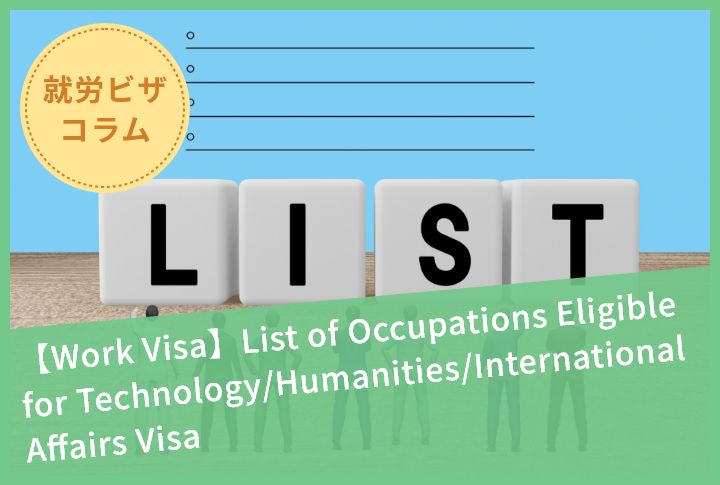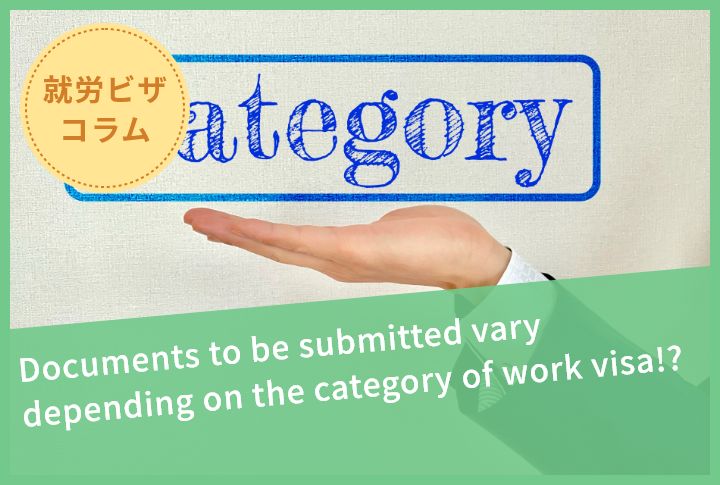【Work Visa】List of Occupations Eligible for Technology/Humanities/International Affairs Visa

By obtaining a work visa, foreign nationals are allowed to work in Japan.
However, the types of jobs that can be performed using a work visa are limited.
It may not be clear exactly which occupations are eligible.
Therefore, on this page, we introduce the types of occupations that can be worked under the Technology/Humanities/International Affairs visa.
Additionally, we provide examples of occupations that cannot be worked under the Technology/Humanities/International Affairs visa, so please refer to them.
Index
1. Examples of occupations eligible for the Technology/Humanities/International Affairs visa
What types of occupations are eligible for the Technology/Humanities/International Affairs visa?
The answer lies in the Immigration Control Act.
The Immigration Control Act specifies as follows:
Since the above may not provide a clear idea of specific job titles, we will explain the types of occupations and their general job descriptions that can work under each visa category: Technology/Humanities/International Affairs.
1-1. Technology Category
Occupations eligible under the technology category include the following:
- System Engineer (SE)
- Programmer
- Engineer
- Information System Specialist
- Database Engineer
Here are details below.
System Engineer (SE)
System Engineer (SE) is responsible for the upstream processes of system development.
Specifically, they handle tasks such as gathering client needs and creating design documents. While programmers are mainly responsible for actual programming, system engineers also need to possess knowledge related to programming.
Programmer
A Programmer is responsible for the downstream processes of system development.
They carry out programming based on design documents created by System Engineers and conduct testing to ensure there are no bugs.
Due to the shortage of programming talent in Japan, there are abundant job opportunities for programmers.
Engineer
An Engineer is someone with specialized knowledge and skills in engineering or science. They work in fields like agriculture, forestry, fisheries, or manufacturing, and their tasks may include research, development, and production.
Information Systems Specialist
An information Systems Specialist manages and supports the IT department of a company.
They handle tasks such as helpdesk support and planning, building, operating, and maintaining IT infrastructure.
This role requires high expertise and has a wide range of responsibilities.
Database Engineer
Database construction refers to storing data on servers and managing it on computers. Constructing databases improves operational efficiency by allowing quick access to necessary information.
Ideally, individuals pursuing a career as a Database Engineer should have experience as Programmers or System Engineers.
1-2. Humanities Category
Occupations eligible under the humanities category include the following:
- Sales
- Marketing
- Public Relations (PR)
- Product Development
- Planning
- Consulting
- Accounting
- Human Resources (HR)
- General Affairs (GA)
- Legal Affairs
Here are details below.
Sales
Sales refers to selling company products or services and acquiring clients who place orders.
To excel in sales, one needs a wide range of skills including research, planning, and scheduling abilities.
There are various types of sales roles such as individual sales, corporate sales, and inside sales, each requiring different skills and offering different benefits.
Marketing
Marketing is challenging to define but can be summarized as creating mechanisms for products to sell without aggressive promotion.
Therefore, it contrasts with sales.
Marketing roles involve tasks like planning new products or services and selecting and researching markets.
Public Relations (PR)
PR refers to disseminating information to internal and external stakeholders.
External PR aims to enhance the company or service’s visibility in society and organize events, while internal PR fosters company culture and employee satisfaction through internal event planning and newsletters.
Product Development
Product development refers to developing products or goods.
Generally, it entails shaping ideas planned by product planners into tangible products. Individuals suited for product development are often highly perceptive to market trends and possess excellent communication skills.
Planning
Planning refers to devising ideas to solve company issues.
It requires utilizing various research data, information, and experience.
To excel in planning roles, one needs the ability to implement PDCA cycles for business improvement.
Consulting
Consulting entails discovering and solving client issues.
There are different types of consultants such as strategic consultants who propose strategies and IT consultants who focus on IT strategies and DX promotion.
Consulting demands deep industry knowledge and problem-solving abilities.
Accounting
Accounting refers to managing a company’s money, including profits, assets, and financial transactions.
Tasks include daily sales and procurement management, salary and insurance calculations, tax calculations, and financial statement creation.
Accuracy and diligence are essential traits for accountants.
Human Resources (HR)
HR manages employee recruitment, education, evaluation.
Also, they take labor management to protect employees from harsh working conditions.
Holding qualifications such as Certified Social Insurance Labor Consultant can be advantageous for HR roles.
General Affairs (GA)
GA handles various tasks such as managing company supplies and organizing shareholder meetings.
To excel in GA roles, you will need not only administrative skills and computer skills, but also the ability to negotiate with another department.
Legal Affairs
Legal affairs refer to tasks related to business activities and legal matters.
Responsibilities include legal checks on contracts and transactions, legal consultations, and dispute litigation.
Legal professionals need both legal expertise and communication skills.
1-3. International Affairs Category
Occupations eligible under the international affairs category include the following:
- Trade
- Translation/Interpretation
- Language instructor at language school etc.
- Designer
Here are details below.
Trade
Trade refers to the profession of conducting transactions of goods with another country. Specific job duties include creating and verifying trade documents, arranging shipments, transportation, customs clearance, and managing shipments and deliveries.
To excel in trade-related roles, skills in office tasks and a global perspective are required.
Translation and Interpretation
Translation refers to translating written words into another language, while interpretation refers to translating spoken words into the language of the listener.
To work in translation or interpretation in Japan, a certain level of Japanese language proficiency is required.
Translation and interpretation roles are in high demand in inbound-related industries such as hotels and tourist destinations.
Language Instructor at Language Schools
Language instructors at language schools utilize their proficiency in Japanese and their native language.
This profession is popular among those with strong language skills.
Designer
Designers work in various fields such as fashion design and web design.
They can leverage their unique sensibility as foreigners.
This profession provides valuable skills and may lead to future independence as a freelancer.
These are representative examples of occupations that can be pursued with the Technology/Humanities/International Affairs visa.
It is important to note that even if the above occupations are listed, it does not guarantee compliance with Immigration Control Act.
For example, if someone obtains a work visa with the intention of working in a sales position but ends up consistently performing tasks such as stocking shelves or handling merchandise at the site, they may be deemed to be outside the scope of the Technology/Humanities/International Affairs visa category.
Therefore, it is crucial to consider not only the timing of obtaining the work visa but also the activities after obtaining it.
In fact, the nature of the work performed is an essential aspect not only during the process of obtaining the Technology/Humanities/International Affairs visa but also during its renewal. Therefore, it is advisable to regularly check whether the daily activities comply with the requirements of the work visa.
2. Examples of occupations NOT eligible for the Technology/Humanities/International Affairs visa
Occupations that are considered as simple labor under Immigration Control Act are among those that cannot be pursued with the Technology/Humanities/International Affairs visa.
Examples include line work in factories, work in logistics or warehouses, work at construction sites, and customer service in restaurants.
Additionally, professions such as craftsmen, artists, and university professors are also ineligible for the Technology/Humanities/International Affairs visa.
To engage in these types of work, obtaining a different category of work visa is necessary.
Therefore, when aiming to obtain a work visa, it is crucial to determine which category of work visa corresponds to the nature of the job.
3. Summary:
As mentioned on this page, the Technology/Humanities/International Affairs visa allows for work in various occupations.
However, the occupations presented here are not exhaustive, so if you have other types of work you wish to engage in, it is crucial to confirm whether the actual tasks align with the requirements of the Technology/Humanities/International Affairs visa.
However, it may be difficult for you to make this judgment on your own.
In the event of an error in judgment, your visa application could be denied.
Therefore, to avoid such risks, it is recommended to consult with an administrative scrivener who is knowledgeable about Immigration Control Act.
Additionally, for international students, seeking advice from the university’s career center is also an option.
We Administrative Scrivener Daiichi Sogo Office has a proven track record in obtaining work visas for foreigners.
We offer free consultations, so please feel free to contact us with any inquiries.
























